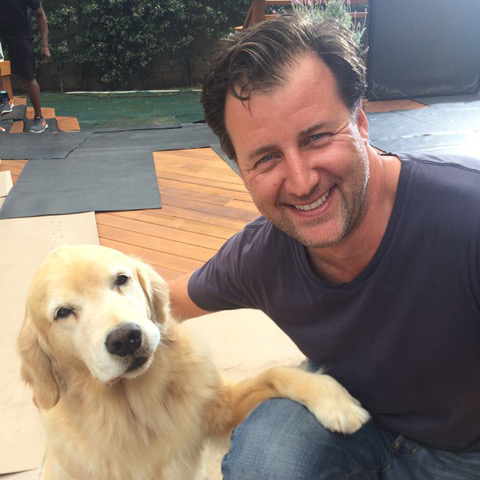Film Career Finder
Start Here:
1st Assistant Director
Career Overview
The 1st Assistant Director manages the schedule for a film set and coordinates all on-set departments for each shot.
Alternate Titles
1st AD
Salary Range
$50,000 to $75,000

How To Become a 1st Assistant Director
- Career Description
- Salary
- Career Outlook
- Career Path
- Experience & Skills
- Education & Training
- Additional Resources
- Sources
- References
Career Description
The 1st Assistant Director or 1st AD plays a vital role on a film, as this is the person who ensures a smooth production. They’re the person who “runs the set,” but their job begins well before the camera starts rolling.
A 1st AD first helps in determining how every single scene in a script is going to be shot. That means creating a script breakdown that analyzes what kind and how many shots will be needed for each scene. While still in pre-production, a 1st AD will create a shot list alongside the Director and Director of Photography. They are included as well in the storyboarding process, as it helps in the visualization of those shots.
The 1st AD is also the person who creates both the shooting schedule for the entirety of principal photography and the call sheet for each individual day of production. During production, they are the liaison between the Director and the rest of the crew. That means tracking how long each shot is taking and keeping the crew on schedule. The 1st AD will likewise evaluate the daily progress of a production to determine if they are tracking with the projected amount of time required to complete the production.
As the above responsibilities demonstrate, the 1st AD is critical to the success of a film, TV show, commercial, or other type of production.
To learn about the role of the 1st Assistant Director and what this integral role does on set, we spoke to three 1st ADs working in film, TV, and commercial production.
In this article, you’ll hear from:
- Rudy Van Zyl (American Horror Story, SpongeBob SquarePants)
- Tony Kountz (MacGuyver, The Originals, CSI: NY)
- Billy Greenfield (Dollface, Get Shorty, Fatal Affair)
Salary
According to ZipRecruiter, the average annual salary for a 1st Assistant Director is approximately $72,280. But that number can fluctuate depending on any number of factors, including:
- DGA membership
- Production budget
- 1st AD experience
- Number of jobs in a given year
All these factors combined, the average salary of a 1st AD is between $50,000 and $75,000. If a 1st AD joins the Directors Guild of America, they may make more due to the set rates for their position as determined by the union.
A 1st AD is hired from job to job, which means that their salary in a given year can vary significantly from that of the previous–for good or for bad. This position, just like many others in the entertainment industry, often means income that can rise or fall greatly from year to year over the course of their career.
Hey, what do you think about trying our new Film Career HelperFilm Career Helper really quick? It’s totally free and could help get your career moving fast! Give it a try. It’s totally free and you have nothing to lose.
Career Outlook
Given how important a 1st AD is to a production, a great one can be in high demand.
While many other specialties in production–Actor, Director, DP–might attract more people, those in the industry know that a 1st AD who understands what’s required of them is just as vital to a production as any of those other higher-profile roles.
That’s why a reliable and resilient 1st AD can enjoy relative job security–as much as anyone can in entertainment–because the Directors and Producers who work with them will likely want to continue working with them.
A great 1st AD can build a strong reputation through their work ethic, organizational skills, and ability to keep cool under pressure. However, their overall success also depends on making connections throughout their career so that their name is the first one people think of when a new gig gets the green light.
Aspiring 1st ADs should keep in mind as well the unpredictable nature of the entertainment industry. Though they may be highly competent, projects come and go all the time, which can make for an overall erratic career.
Career Path
Unlike an Actor, Director, Director of Photography, and other production specialties, there isn’t as much attention or emphasis in the academic sphere on becoming a 1st AD. That means the career path for one must largely be forged on their own.
What aspiring 1st ADs do have in common with other specialties is that most people just starting their careers begin with smaller projects where they can learn on the job. For a 1st AD, that might mean honing their skills and talent on student films or short films.
They might also join larger productions as an Intern, Production Assistant, or 2nd AD, which can still afford them the opportunity to learn. While they carry out their own assigned tasks, they can observe what it takes to be a 1st AD.
Because 1st ADs have so many responsibilities during both pre-production and principal photography, it’s a good idea for people setting out on this career path to offer their services to as many productions as they can to gain experience. In many instances, this might mean volunteer work, especially if the gig is a student or short film.
As that expertise is gained, even a relatively new 1st AD can ascend the career ladder and take on bigger and more complicated projects. Depending on a 1st AD’s career goals, they might continue to move through the ranks to more commercial and expensive productions or remain more so in the independent filmmaking world.
Experience & Skills
A great 1st AD must come equipped with multiple skillsets.
First, they must understand how to analyze and break down a script scene by scene. Second, they must be able to collaborate and communicate with multiple people over the lifespan of a project. Third, they must have topnotch time management skills to ensure that the schedule and budget of a production will be met on their watch.
While some of these skillsets can be honed in a classroom, it’s really in the practice of them that a 1st AD becomes an expert in their field. That’s why experience really does count.
Especially when it comes to being on set and having to manage both people and the ever-ticking clock, that’s when learning how to keep your cool and keep a production moving forward becomes invaluable. But every great 1st AD has to start somewhere.
For anyone looking to enter this part of the entertainment industry, say yes to whatever opportunities you can. Even if that means initially taking on Intern, PA, or 2nd AD gigs. You’ll still get to study what the 1st AD does and learn from them.
What is oftentimes the case with small productions like a student film is that there is little in the way of payment, which means that emerging 1st ADs might have to take on projects pro bono from time to time as they gain experience.
While being able to provide for necessities is important, whatever you can reasonably do to gain experience until you’re able to join productions with a proper budget can absolutely help you develop and master the many skillsets required to be a 1st AD.
Breaking Down A Script
- Get Organized
- Reading (And Rereading) The Script
- Identifying The Story Elements
- Creating a Breakdown List
- Breaking Down Scenes
- Character List
- Identify Dressing and Props
- Tracking Wardrobe
- Ascertain Special Effects And Stunts
- Track Continuity
- Estimate Resources and Time
- Prioritize Scenes
- Review And Revise
Organization is a crucial element of the script breakdown process. Ultimately, you’ll be compartmentalizing every aspect of the screenplay and confirming that the material is accessible to the appropriate departments, so you’ll want your work to be clear and arranged so it can be easily and clearly understood.
Be sure to read the script several times through, so as to overly-familiarize yourself with it. Screenplays are often layered, subtextual documents that require a number of readings before they can be comprehensively understood. And that’s from a creative standpoint. The same idea applies from a technical one – you want to be fully knowledgeable about the script before diving in and breaking it down.
Elements such as genre, time period and setting need to be called out right away, but as you dive deeper into the text, it’ll become necessary to understand the core narrative of the screenplay. This will be useful when it comes to making informed decisions during the breakdown.
Use script breakdown software (or the traditional pencil and paper) to build a spreadsheet of scene numbers, characters, wardrobe, props, locations, costumes, special effects and more.
Break down each scene to their base components. Take note of setting/location, time of day, and any and all particular specifics for each scene. List out the characters needed for the scene and any notable actions that occur during the scene.
Build a list for all of the characters in each scene. Keep track of all significant character details, like specific props and wardrobe variations.
You’ll need to create a list for all set dressing and props needed for each scene. Details are vital here, so be sure to include both tangible items as well as elements that contribute to the scene’s atmosphere.
Create a timeline for character wardrobe changes throughout the screenplay. The costume department will need that information to ensure character and narrative continuity in dressing.
Identify scenes that involve stunts, special effects, and any other potential technical challenges. Stunt work and effects (both practical and CGI) require endless amounts of prep time and this list will allow for proper planning and coordination with the relevant departments to ensure safety and feasibility.
Remember that consistency is crucial when it comes to creating a believable narrative for an audience. You’ll want to ensure continuity by noting any repeated actions, props, or details across scenes.
Analyze each scene in terms of what’s needed as far as resources and time. In your account, include the number of setups the director has required, the complexity of the shots you’re going for, and any logistical challenges associated with the location.
Sometimes, productions run over budget and over schedule and scenes will need to be sacrificed. Prioritize scenes based on logistical factors, budget constraints, or any other creative considerations that may impact the production schedule. This ensures that essential elements are addressed first. Confer with the film’s director on these points and confirm that the most crucial Material Is Towards The Top Of The List.
For a variety of reasons, scripts are constantly being revised and rewritten. Make sure you’re up on every change the script goes through so as to ensure your breakdown reflects the most updated version of the screenplay. Be sure to keep a careful eye out for everything that gets revised; even the smallest changes can alter budget, props, costumes, casting, location, and scheduling.
For a fun look at breaking down a script, check out this fast overview of the process, Deadpool style.
And if you’re looking for something that dives a bit further into the nitty gritty, take a look at this video.
Education & Training
A college degree is not required to become a successful 1st AD. That being said, it can help.
Higher education is where you can learn in a relatively low-stress and low-stakes environment. You can also create valuable relationships with like-minded people–aspiring Actors, Directors, DPs, and the like–who might one day recommend you for a job. And when it comes to evaluating a script and understanding how what’s on the page will translate to actual footage, film school again can prove useful to an aspiring 1st AD.
If you decide to pursue a degree, you’ll likely want to go to a school with a strong general film production program so that you get plenty of instruction and firsthand experience with all things pre-production and principal photography.
Whether or not you start off your 1st AD career with college, it’s only a steppingstone to it. The greater education will likely be in the real world. That’s where you are saying yes to short films, indie films, and other smaller budget projects that will allow you to train on the job and gain the necessary experience to continue growing your skillsets.
It’s these kinds of projects that will help you master the most common aspects of being a 1st AD like script breakdowns, shot lists, shooting schedules, and call sheets. The more proficient you become in these areas, the more likely you’ll be asked to 1st AD for other projects and/or to come on board larger projects with bigger budgets.
Additional Resources
Someone aspiring to become a 1st AD doesn’t have to be part of the Directors Guild of America, but it can prove an invaluable resource for those who are members.
Not only can the DGA help members earn a base minimum for their role on a production, but also this organization can be useful in forming and maintaining relationships with other industry professionals.
Sources

Rudy Van Zyl
Rudy was born in South Africa and grew up in what is now known as Kwa-Zulu, Natal. While in South Africa, Rudy worked in the Kruger National Park as a Game Ranger but always wanted to be a filmmaker. He moved to New York City in 1995 and started working his way up the production ranks on commercials, music videos, and films. Rudy’s work brought him to Los Angeles in 1997 and he joined the Director’s Guild of America in 2003.

Billy Greenfield
Billy Greenfield has worked in film, television and commercial production for close to twenty-five years on more than fifty feature films and television shows as either an Assistant Director, Unit Production Manager, Line Producer or Associate Producer.
He has worked with Directors such as Walter Hill, George Clooney, Eric Stoltz, Nancy Hower, Stacy Title and Marshall Herskovitz, and Actors such as Robert Duvall, Ed Harris, Bryan Cranston, Vincent D’Onofrio, Will Ferrell, Seth Rogen, Sam Shephard, Selena Gomez, Megan Fox, Ashley Greene, John C. Reilley, Jason Bateman, Will Arnett and Danny Trejo, and on music videos with musical acts including Destiny’s Child and The Foo Fighters.
His most recent projects were as Production Manager on Dollface for ABC/Hulu, Get Shorty for MGM/Epix and Fatal Affair for Netflix, and as Line producer on the Epic Games Megagrant project Gods of Mars, which utilizes Epic’s Unreal Engine to combine traditional CGI, LED projection and practical miniatures to create photo-realistic visual effects in real time.
He grew up in St. Louis, Missouri and earned a Bachelor’s Degree in Journalism from the University of Missouri-Columbia. He attended Graduate Film School at San Francisco State University and the Graduate Video Program at Webster University in St. Louis, Missouri.
He is an active member of the Director’s Guild of America and serves on the DGA’s Visual Effects and New Technology Committee.

Tony Kountz
I am from La Porte, TX, a small industrial port town near Houston. I graduated from the University of Texas at Austin in 1993 with a BA in English. I went to college to pursue a chemical engineering degree but ended up just trying to graduate with the quickest degree I could get.
During this time I discovered the Radio, Television, and Film department at UT. TV news interested me but I didn’t want to spend the time in college to get an RTF degree since I had already been in school for three years. However, I did find an internship at a local TV station. Part of that job was to help shoot local commercials. This experience put me on the path to becoming an Assistant Director.
I started taking local jobs in Austin, TX that put me on TV and film sets. I did any and every job I could get to learn more about the business in which I was interested. Eventually, I was hired as a Set Production Assistant on a movie called Bottle Rocket. That led to meeting some great mentors who encouraged me to move to Los Angeles.
Once in LA, my mentors helped get me on more sets as a PA and finally as a 2nd AD. I was able to quickly move up to a 1st AD on low budget shows.
I joined the Directors Guild of America in 1999 and have worked on many films and TV programs since then. I am currently the 1st AD on Stargirl, which airs on the CW. Recently, I was the 1st AD on MacGyver, and The Originals.
References
- 1ZipRecruiter. "First Assistant Director Salary". ZipRecruiter. published: 30 September 2022. retrieved on: 30 September 2022